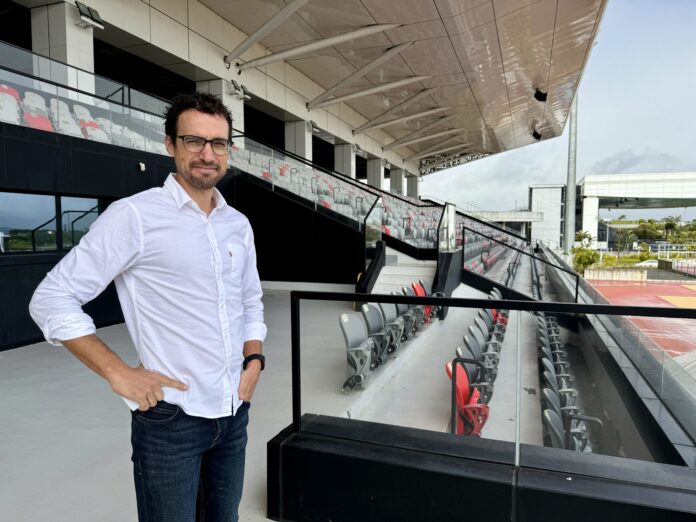As the interview progresses, I can’t help thinking that Yannick, Director of the Côte d’Or National High Performance Center (CHP), is right at home here. Is it because of his Master’s degree in sports performance optimization (science and biomechanics) from the Université Paul Sabatier Toulouse III, or because of his assiduous drive to shake up the world of top-level sport? Definitely both! Delphine Raimond
Yannick’s clear-sighted view of his thirty-year career – he started cycling at the age of eleven – gives me permission to discuss with him the various aspects of an elite sportsman’s career. When an athlete is prepared for the ascent, for the continuous improvement of his performance leading to success, to victories… what we obviously wonder is whether he is prepared for failure, for defeats. Since watching Strong, aussi forts que fragiles, a documentary from 2023, a few days before my meeting with Yannick, in which five athletes confide in each other about their careers, achievements, family life, doubts, difficulties and suffering, I’ve been thinking: “When you win, it’s routine; when you lose, it’s chaos! Yannick smiles, nods and immediately grasps the significance of the quote.
LGM: What do you think about the pressure of results and managing failure?
YL: The victories scattered throughout my career represent barely 10%! The vast majority are failures. To keep moving forward and get back on track, there’s only one word: resilience. Everyone’s ability to cope is very personal, but in my opinion, resilience is one of the most important qualities a sportsman or sportswoman should have, even before talent! It depends on many factors, such as childhood, education and culture, but it’s essential in all areas and at all times of life. For my part, I’m obliged to detach myself from all that, as I’ve never experienced professionalism and remain involved in amateur and leisure sport.
LGM: Is staying in amateur sport a choice you made?
YL : Yes, even though I went all the way to the Olympics in 2016, I’m still the epitome of an amateur athlete, because I never gave priority to my sport. My parents directed me to study first and foremost, so sport was never meant to take precedence! You know, they were never sportsmen and nobody in my family ever pushed me into competitive sport. So, at the FAC, I didn’t miss a single class, even the lectures, unlike many students who practised sport with me and only went to the compulsory classes. I was lucky enough to progress in cycling in a good club, but I never put my studies on the back burner!
LGM: You’ve won some fine medals in your career, but are you continuing to compete?
YL: I’m still racing, but I’ve put the brakes on road biking, which is far too demanding! I’ve concentrated on mountain biking, which is more free and independent. I try to keep one or two objectives in the year, to keep having fun. Last year, for example, I took part in the World Masters Championships in Australia, and finished3rd!
LGM: How do you manage your hectic day-to-day life, juggling personal, professional and sporting commitments?
YL: It’s true that I optimize every minute, every second. A shower takes exactly 4 minutes 30 (Laughs), so it doesn’t push everything else! I mustn’t be late for breakfast with the girls, to prepare Lana’s meals, her schoolbag and so on. The organization is meticulous, to make the most of everything I want to do during the day! We don’t go to the movies or to restaurants… but we don’t miss any of it! Nevertheless, I recognize that the notion of sacrifice does exist, with regard to others. My children, brothers and sisters, parents and friends. The time devoted to my sporting passion is to their detriment, but for me it’s not a sacrifice!
LGM: You are married to champion Aurélie Halvwachs – selected for this summer’s Paris Olympics in mountain biking – and together they have two young daughters, Lana, 8, and Alison, 2. How do they cope with the omnipresence of sport in the home?
YL: They see us training every day and understand that sport, which is an integral part of our lives, is important for theirs. But we never push them towards competition! Lana lives her life, loves to dance, goes rollerblading, does a bit of cycling… she’s active. She loves competition, even if she’s liquefied at the starting line!(I question him with my eyes, and he explains calmly.) It’s very difficult for her, because the people around her put so much pressure on her. “You’re Yannick and Aurélie’s daughter, you’re bound to be a champion! So she tells herself she has to win, to make her parents proud! She feels obliged to deliver! We work hard to deconstruct this label and let her live her life. We’re very relaxed about it. Alison, on the other hand, is a dynamite, she’s got too much energy! (Laughs.) On rainy days, she tears the house down! We’ll put her in a sport that takes up a lot of her time and energy, to channel it.
LGM: How do you view the role of parents of top-level athletes, even from a very early age?
YL: There are parents who are still very much involved in the child’s career (he gives me examples). They push him and never give up. But to maintain a healthy family relationship, at some point the coach has to take over. At the age of 14-16, you’re no longer doing sport for your parents, but for your coach! Then, the intrinsic motivation to succeed, to do it for oneself, arrives around the age of 20. I’m thinking of children who are groomed from birth to be top-level athletes… It may work, but the percentage is infinitesimal! And if that’s not the case, if the child never becomes a champion, by the time he’s 40, what’s his relationship with his parents? I can tell you that in 100% of cases, things end badly!
The pleasant interview comes to an end, Yannick looks at his watch and agrees to show me around; we have three quarters of an hour before his next appointment! I feel privileged to have been given this precious time, and follow him on a very instructive tour. Find out more about the Complexe sportif de Côte d’Or in this month’s dossier.





